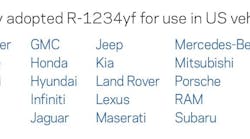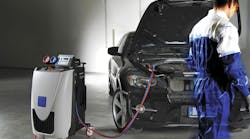The Massachusetts Auto Body Association (MABA) testified in support of the Massachusetts Division of Insurance’s proposed repeal of 211 CMR 93:00, which is known as the cost containment regulation.
The regulation, promulgated as part of the 1988 Automobile Insurance Reform Act, required the Automobile Insures Bureau (AIB), which represents the state’s insurers, to file an annual report with the Division of Insurance that documented efforts to help reduce insurance costs in the state.
The Division determined the regulation is outdated due to recent laws and regulations changes that have been made to assist with the transition towards managed competition in the Massachusetts automobile insurance market. Steve Regan, spokesman for the Massachusetts Auto Body Association (MABA), testified in support of the proposed repeal on Sept. 19, stating that the intent of this regulation to control insurance costs had evolved into a tool used by some insurers to pay less than fair market value for labor and services, as well as to challenge legal action by repairers and consumers seeking to be reimbursed for alleged underpayment of claims.
“This regulation was designed to rein in rising insurance premiums through efficiencies and controlling fraud,” says Regan. “Unfortunately, many insurers have used the regulation as justification for mandating certain repair procedures and dictating what a repairer will be paid. It had also been used successfully as a legal defense by insurers against lawsuits by consumers and repairers seeking to be paid what they contend were fair and reasonable charges. This was not the intent and the repeal will remove a great barrier to repairers and consumers who are trying to regain control of their businesses and be paid appropriately for their claim.”
While technically the regulation is only a requirement for insurers to submit a report on the efforts they have undertaken to control costs and fraud, in practice some insurers and appraisers have often used it as a state authorization for their mandating the use of aftermarket parts, and dictating labor and storage payments. It also has been used as a legal defense, sometimes successfully, sometimes not, when repairers and/or consumers file suit.
Specifically 221 CMR 93.04 required insurers to “report on efforts that helped reduce or control auto body cost in the following areas.”
(4) AIB Filing on Bodyshop Payments Issue. In addressing the bodyshop payments issue, the AIB's filing shall address, at a minimum, issues raised in the Decision on 1987 Rates, including the following:
(a) Parts costs - efforts insurers make to pay less than the full retail price for parts and to locate and, where appropriate, insist on the use of aftermarket parts and used and rebuilt parts;
(b) Labor rates - efforts to determine whether labor rates are reasonable, to resist increases, or to lower rates;
(c) Labor times - efforts to determine whether labor times are reasonable and whether they reflect times actually spent on the repair;
(d) Bodyshop recommendations - to the extent permitted under 212 CMR (Auto Damage Appraisers Licensing Board), as interpreted by the Massachusetts courts, efforts to suggest or recommend that insureds use specific bodyshops, and that insureds do not use bodyshops whose methods or equipment are inefficient or outdated or whose charges are excessive;
(e) Fraud - efforts to control fraud in the payment of bodyshops' or insureds' claims for
repairs, towing or storage, or insureds' claims for reimbursement for total losses;
(f) Total losses - efforts to ensure that insurers are not declaring a car a total loss which
prudent claims evaluation would have shown could have been repaired at less cost;
(g) Storage - efforts to ensure that storage times and charges are reasonable, or to reduce times or charges;
(h) Towing - efforts to ensure that towing charges are reasonable or to reduce charges; and
(i) General - efforts to ensure that bodyshops are not reimbursed for unauthorized repairs or charges, and efforts to provide formal training and continuing education for appraisers
MABA had been seeking the repeal of this regulation for many years without success. However, with a new governor and insurance commissioner and the advent of deregulation coming to Massachusetts, MABA said it is hopeful that more actions like this will be taken soon.
“Massachusetts has begun to disassemble a process that had the state set rates for insurance premiums and mandate certain discounts for policyholders by insurers in order to promote competition,” says Regan. “It is good to know that the state is also seeking to remove the barriers that repairers have faced, which allowed insurers to control their businesses and their customers. With the repeal of “cost containment” repairers are now also free to compete for customers and be paid rates and fees that reflect their cost of doing business.”

